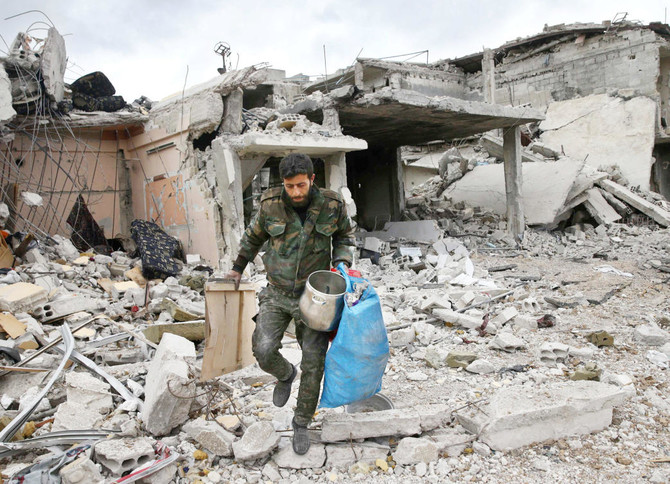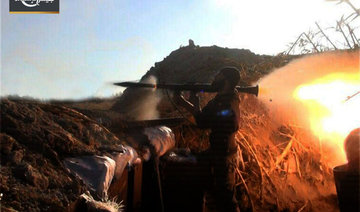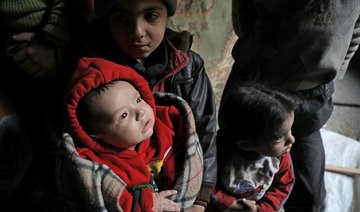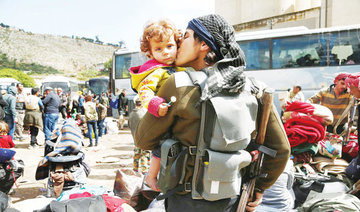BEIRUT: Iyad Abdelaziz, a council member of the opposition-controlled town of Douma in the Eastern Ghotua suburbs of Damascus, said reports of an agreement to surrender the town to the central government are not true.
Abdelaziz said there was no agreement reached to have the Army of Islam rebel faction leave Douma for northern Syria and hand over the town to government forces.
He said, however, that “humanitarian cases” will be allowed to evacuate on Monday.
Douma has been besieged by regime forces since 2013. It was one of the earliest hubs of the Arab Spring-styled uprising against President Bashar Assad that swept through the country in 2011.
Hundreds of residents are believed to require care for war wounds and medical conditions exacerbated by the siege. The regime routinely blocks aid groups from evacuating patients from besieged areas for medical care.
An opposition official said the Army of Islam was still engaged in talks with Russia over the future of Douma. Russia is a key backer of the Syrian government.
Ahmad Ramadan said Turkey, which backs various Syrian opposition groups, and shares control over a part of opposition territory in north Syria, is also party to the talks.
The Syrian regime’s media earlier said fighters belonging to the Army of Islam group had agreed to evacuate their stronghold in the suburbs of Damascus, giving the regime complete control of the Eastern Ghouta region which has been rebel-held since 2011.
The Central Military Media outlet, which is linked to the Syrian military, said the Army of Islam had agreed to leave the town of besieged town of Douma for Jarablus, a town shared between rebel and Turkish control in north Syria.
It said a local council for Douma will be formed with the approval of the Damascus regime.
Douma was one of the earliest hubs of the uprising against President Bashar Assad in 2011. The security services responded by putting the town and other suburbs around Damascus under siege, bombing hospitals and residential areas, and blocking food and medical relief.
Douma is one of the last pockets of the opposition around the capital to hold out against the regime. The city’s fall would seal the rebels’ worst defeat since 2016.
The Britain-based Syrian Observatory for Human Rights monitoring group reported earlier in the day Russia’s military police would be deployed inside Douma to take custodianship of the town.
Opposition sources say Jaish Al-Islam officials have been desperately trying to strike a deal that would bring Russian military police into Douma, and let the group keep a role in maintaining internal security but under the state’s overall jurisdiction.
Russian military officers negotiating with Jaish Al-Islam told the group it accepted such an arrangement but the Syrian regime remained against it, a senior opposition source familiar with the talks said.
Russia was behind the main battle plan, directing elite forces and militias on the ground and calling in airstrikes from Syrian and Russian warplanes, two Western intelligence sources based in the region told Reuters this week.
The Syrian army last week warned the insurgents to surrender or face a military assault to drive them out.
The Syrian army command said on Saturday it had regained most of the towns and villages in Eastern Ghouta and was pressing its military operations in Douma.
The city’s fall would seal the rebels’ worst defeat since 2016.
The once bustling commercial hub on the outskirts of the capital was the main center of street protests in the Damascus suburbs against Assad’s rule that ignited the conflict more than seven years ago.
Defense analysts say a major goal of the regime’s campaign was to complete a security belt around the capital, where for years fighters dug into a network of tunnels and well-fortified positions resisted countless offensives to seize the enclave.
Many of the predominantly Sunni Muslim inhabitants of eastern Ghouta say they fear their displacement was part of a deliberate attempt to bring demographic changes in strategic areas that dilutes their presence in favor of Assad’s Alawite sect and other minorities.
Syrian rebels deny deal over Ghouta town
Syrian rebels deny deal over Ghouta town

Reactions to the crash of the Iranian president’s helicopter

- Iraqi government said it instructed relevant bodies to offer help to neighboring Iran in the search mission
LONDON: Following are reactions from foreign governments and officials to the news that a helicopter carrying Iranian President Ebrahim Raisi and his foreign minister crashed as it flew over mountain terrain in heavy fog on Sunday.
US STATE DEPARTMENT
“We are closely following reports of a possible hard landing of a helicopter in Iran carrying the Iranian president and foreign minister,” a State Department spokesperson said in a statement.
US PRESIDENT JOE BIDEN
A spokesperson for President Biden, Karine Jean-Pierre, told reporters aboard Air Force One that the president had been briefed on the situation. She did not elaborate.
AZERI PRESIDENT ILHAM ALIYEV (Raisi was returning from Iran’s border with Azerbaijan when his helicopter crashed).
“Today, after bidding a friendly farewell to the (visiting) President of the Islamic Republic of Iran, Ebrahim Raisi, we were profoundly troubled by the news of a helicopter carrying the top delegation crash-landing in Iran.”
“Our prayers to Allah Almighty are with President Ebrahim Raisi and the accompanying delegation. As a neighbor, friend, and brotherly country, the Republic of Azerbaijan stands ready to offer any assistance needed.”
IRAQI GOVERNMENT
The Iraqi government said in a statement it had instructed its interior ministry, the Red Crescent and other relevant bodies to offer help to neighboring Iran in the search mission.
UAE food aid shipment arrives in Gaza

- Shipment arrived via the maritime corridor from Larnaca in Cyprus
DUBAI: A UAE aid shipment carrying 252 tons of food arrived in Gaza bound for the north of the enclave, Emirates News Agency reported on Sunday.
The shipment arrived via the maritime corridor from Larnaca in Cyprus. The delivery involved cooperation from the US, Cyprus, UK, EU and UN.
The supplies were unloaded at UN warehouses in Deir Al-Balah and are awaiting distribution to Palestinians in need.
Emirati Minister of State for International Cooperation Reem Al-Hashimy said that the food supplies will be delivered and distributed in collaboration with international partners and humanitarian organizations, as part of the UAE’s efforts to provide relief and address the humanitarian crisis in the Gaza Strip.
The UAE, in accordance with its historical commitment to the Palestinian people and under the guidance of its leadership, continues to provide urgent humanitarian aid and supplies to Gaza, she added.
Since the war began in October, the UAE has delivered more than 32,000 tons of urgent humanitarian supplies, including food, relief and medical supplies, via 260 flights, 49 airdrops and 1,243 trucks.
The UAE delivery came as Israel closed the Rafah border crossing. The World Health Organization said on Friday that it has received no medical supplies in the Gaza Strip for 10 days.
Helicopter carrying Iran's President Raisi makes rough landing, Iranian media say

- IRNA said the helicopter in question had been carrying Raisi, Foreign Minister Hossein Amirabdollahian and local officials
DUBAI: A helicopter carrying Iranian President Ebrahim Raisi and his foreign minister made a rough landing on Sunday as it was crossing a mountainous area in heavy fog on the way back from a visit to Azerbaijan, Iranian news agencies said.
The bad weather was complicating rescue efforts, the state news agency IRNA reported. The semi-official Fars news agency urged Iranians to pray for Raisi and state TV carried prayers for his safety.
IRNA said the helicopter in question had been carrying Raisi, Foreign Minister Hossein Amirabdollahian and local officials.
Interior Minister Ahmed Vahidi told state TV only that one of the helicopters in a group of three had come down hard, and that authorities were awaiting further details.
Raisi, 63, was elected president at the second attempt in 2021, and since taking office has ordered a tightening of morality laws, overseen a bloody crackdown on anti-government protests and pushed hard in nuclear talks with world powers.
In Iran’s dual political system, split between the clerical establishment and the government, it is the supreme leader rather than the president who has the final say on all major policies.
But many see Raisi as a strong contender to succeed his mentor, Supreme Leader Ayatollah Ali Khamenei, who has strongly endorsed Raisi's main policies.
Israel war cabinet minister says to quit unless Gaza plan approved

- Israeli PM Benjamin Netanyahu dismisses comments as "washed-up words"
- Broad splits emerge in Israeli war cabinet as Hamas regroups in northern Gaza
JERUSALEM: Israeli war cabinet minister Benny Gantz said Saturday he would resign from the body unless Prime Minister Benjamin Netanyahu approved a post-war plan for the Gaza Strip.
“The war cabinet must formulate and approve by June 8 an action plan that will lead to the realization of six strategic goals of national importance.. (or) we will be forced to resign from the government,” Gantz said, referring to his party, in a televised address directed at Netanyahu.
Gantz said the six goals included toppling Hamas, ensuring Israeli security control over the Palestinian territory and returning Israeli hostages.
“Along with maintaining Israeli security control, establish an American, European, Arab and Palestinian administration that will manage civilian affairs in the Gaza Strip and lay the foundation for a future alternative that is not Hamas or (Mahmud) Abbas,” he said, referring to the president of the Palestinian Authority.
He also urged the normalization of ties with Saudi Arabia “as part of an overall move that will create an alliance with the free world and the Arab world against Iran and its affiliates.”
Netanyahu responded to Gantz’s threat on Saturday by slamming the minister’s demands as “washed-up words whose meaning is clear: the end of the war and a defeat for Israel, the abandoning of most of the hostages, leaving Hamas intact and the establishment of a Palestinian state.”
The Israeli army has been battling Hamas militants across the Gaza Strip for more than seven months.
But broad splits have emerged in the Israeli war cabinet in recent days after Hamas fighters regrouped in northern Gaza, an area where Israel previously said the group had been neutralized.
Netanyahu came under personal attack from Defense Minister Yoav Gallant on Wednesday for failing to rule out an Israeli government in Gaza after the war.
The Gaza war broke out after Hamas’s attack on October 7 on southern Israel which resulted in the deaths of more than 1,170 people, mostly civilians, according to an AFP tally of Israeli official figures.
The militants also seized about 250 hostages, 124 of whom Israel estimates remain in Gaza, including 37 the military says are dead.
Israel’s military retaliation against Hamas has killed at least 35,386 people, mostly civilians, according to the Hamas-run Gaza’s health ministry, and an Israeli siege has brought dire food shortages and the threat of famine.
US, Iranian officials met in Oman after Israel escalation

- Washington called on Tehran to rein in proxy forces
- Officials sat in separate rooms with Omani intermediaries passing messages
LONDON: US and Iranian officials held talks in Oman last week aimed at reducing regional tensions, the New York Times reported.
Through intermediaries from Oman, Washington’s top Middle East official Brett McGurk and the deputy special envoy for Iran, Abram Paley, spoke with Iranian counterparts.
It was the first contact between the two countries in the wake of Iran’s retaliatory missile and drone attack on Israel in April.
The US officials, who communicated with their Iranian counterparts in a separate room — with Omani officials passing on messages — requested that Tehran rein in its proxy forces across the region.
The US has had no diplomatic contact with Iran since 1979, and communicates with the country using intermediaries and back channels.
Since the outbreak of the Gaza war last October, Iran-backed militias — including Hezbollah in Lebanon, the Houthis in Yemen, and armed groups in Syria and Iraq — have ramped up attacks on Israeli and American targets.
But US officials have determined that neither Hezbollah nor Iran want an escalation and wider war.
After Israel struck Iran’s consulate in Damascus at the beginning of April, Tehran retaliated with hundreds of ballistic missiles and drones.
The attack — which was intercepted by air defense systems from Israel, the US and the UK, among others — was the first ever direct Iranian strike on Israel, which has for years targeted Iranian assets in Syria, whose government is a close ally of Tehran.
National Security Adviser Jake Sullivan said in a news conference this week that the “Iranian threat” to Israel and US interests “is clear.”
He added: “We are working with Israel and other partners to protect against these threats and to prevent escalation into an all-out regional war through a calibrated combination of diplomacy, deterrence, force posture adjustments and use of force when necessary to protect our people and to defend our interests and our allies.”


















